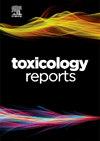Acute toxicity of trypsin inhibitor from tamarind seeds in embryo and adult zebrafish (Danio rerio)
Q1 Environmental Science
引用次数: 0
Abstract
The trypsin inhibitor isolated from tamarind seeds (TTI) is being investigated for potential applications in the treatment of noncommunicable diseases (NCD), such as hypertension, obesity, and diabetes. This study aimed to assess TTI embryotoxicity and acute toxicity in adult zebrafish (Danio rerio). TTI was extracted and isolated from tamarind seeds. Embryonic and adult zebrafish were exposed for 96 hours to three concentrations of TTI (12.5, 25, and 50 mg/L). Zebrafish embryos (n=60 per group) were evaluated for survival, hatching, malformations, and potential developmental marker alterations, in addition to cardiotoxicity and neurotoxicity tests. For acute toxicity assessment in adults (n=20 per group), survival and locomotor and anxiety-like behaviors were assessed, along with genotoxicity (micronucleus) evaluation. Embryos exposed to TTI showed no significant adverse effects, presented normal heart rates and positive reflex response in the neurotoxicity tests. In adult fish, TTI did not cause mortality or significant behavioral changes, suggesting no neurotoxicity and no genotoxicity. Histopathological analyses of the whole body showed only changes in the liver and spinal cord, similar to those observed in the control group not exposed to TTI. These findings indicate TTI's biosafety and therapeutic potential in complex organisms. Further research is required to evaluate its long-term effects and efficacy in treating non-communicable diseases.
罗望子种子中的胰蛋白酶抑制剂对斑马鱼胚胎和成鱼的急性毒性
从罗望子种子中分离出来的胰蛋白酶抑制剂(TTI)正被研究用于治疗高血压、肥胖症和糖尿病等非传染性疾病(NCD)的潜在应用。本研究旨在评估 TTI 对成年斑马鱼(Danio rerio)的胚胎毒性和急性毒性。从罗望子种子中提取并分离出 TTI。将斑马鱼胚胎和成年斑马鱼暴露于三种浓度的 TTI(12.5、25 和 50 毫克/升)中 96 小时。对斑马鱼胚胎(每组 60 个)进行存活率、孵化、畸形和潜在发育标志物改变评估,此外还进行了心脏毒性和神经毒性测试。对于成体(每组 20 个)的急性毒性评估,则评估了存活率、运动和焦虑行为,以及遗传毒性(微核)评估。暴露于 TTI 的胚胎未显示出明显的不良影响,心率正常,神经毒性测试中的反射反应呈阳性。在成鱼体内,TTI 不会导致死亡或明显的行为变化,表明没有神经毒性和遗传毒性。全身组织病理学分析显示,只有肝脏和脊髓发生了变化,与未接触 TTI 的对照组观察到的变化相似。这些研究结果表明了 TTI 在复杂生物体内的生物安全性和治疗潜力。要评估其在治疗非传染性疾病方面的长期效果和疗效,还需要进一步的研究。
本文章由计算机程序翻译,如有差异,请以英文原文为准。
求助全文
约1分钟内获得全文
求助全文
来源期刊

Toxicology Reports
Environmental Science-Health, Toxicology and Mutagenesis
CiteScore
7.60
自引率
0.00%
发文量
228
审稿时长
11 weeks
 求助内容:
求助内容: 应助结果提醒方式:
应助结果提醒方式:


